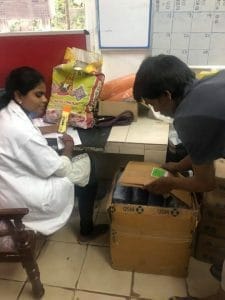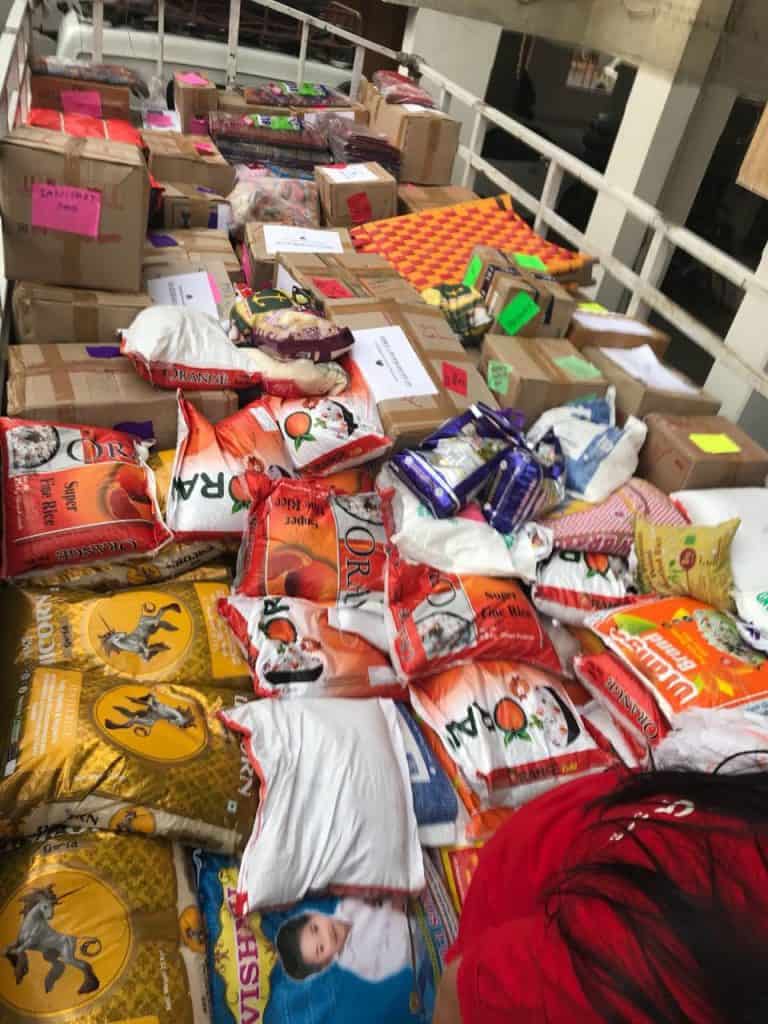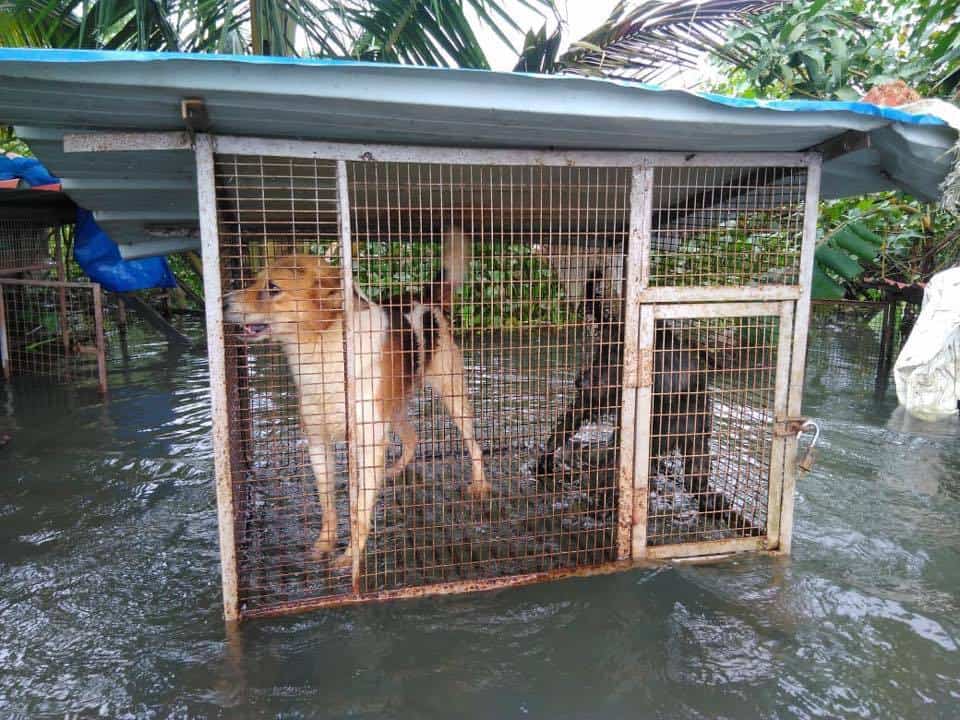The devastating floods in Kerala have ravaged life in the state, with 223 officially reported deaths and 10.28 lakh people stationed across 3274 relief camps, as shared by the state’s Chief Minister Pinarayi Vijayan. The central government has described such unprecedented nature’s fury in the southern state as a ‘calamity of severe nature’. In what reaffirms faith in humanity, help has been pouring in from all quarters to god’s own country, and people have been pitching in to help the flood-stricken reconstruct their lives.
Tamil Nadu shares the Mullaperiyar river with Kerala and has been a party to the century-long rivalry over water sharing, but has been among the frontrunner states when it comes to lending a helping hand to distressed Kerala. “Trucks from Tamil Nadu carrying relief material to Kerala are thronging the borders of the states. Tamil Nadu has risen to the help of its neighbour, setting aside differences,” said Jonathan Gurubabu, a Chennai-based volunteer. Jonathan’s house at West Tambaram is being used as a collection point to pool in the relief material and distribute to the worst affected districts in Kerala.
Social media efforts
Chennai-specific Facebook groups such as The New Face of Society , AnboduKochi, Integrated Social Workers Organisation group and several others are providing details of relief camps and required help in Kerala, while #TNforkerala is among the trending hashtags on Twitter.
Whatsapp groups are being created to recheck the information on demand and organise supplies accordingly. R P Amudhan, a documentary filmmaker has set up a collection centre at ICSA Egmore to meet the demand for rations and basic amenities in relief camps.
“Information is verified from friends and volunteers in Kerala to ensure that the stock doesn’t go to waste. The demand keeps changing, and we are now sending basic utensils and rations for the citizens who are going back to their houses,” Amudhan said, adding that they close the demand thread on social media, once it is met.
Beyond social media
Chennaites who were the victims of floods in November – December 2015 seem to have related to the situation personally. Braving several odds and danger, many volunteers have reached Kerala, to help locals in rescue and rehabilitation. As rains have subsided and roads become accessible in a few districts such as Wayanad, volunteers will help the vulnerable citizens build their homes.
Deepak Valsaraj from the Amaara Foundation has reached Wayanad with five tonnes of relief material, that is now distributed among the tribals whose houses were washed away in the flash floods. “Being a hilly area and with landslides happening time and again, Wayanad is among the worst affected localities. Tribals who work as labourers lost their lives and we are helping them build from scratch,” he said.
Deepak has teamed up with the tribal development officers of Kerala to help out the 3,500 odd tribals in seven camps. Unlike the Chennai floods, the water is fast receding, points out Deepak, even though there are threats of landslides in hilly terrains.
Helping all creatures great and small
An animal rescue team from Chennai has been rescuing abandoned and chained animals in Kerala. The team comprising Nishanth Nichu, Dinesh Baba, Arjun Shah and Albert Peter Christopher are moving the animals to higher grounds.
As the waters recede, the team expects snakes to surface in the once-submerged houses. “We have supplied enough anti-venom vials to treat venomous snake bites. There are a lot of volunteers and welfare organisations that are relentlessly working to rescue and provide relief to animals,” said Nishanth Nichu.
The aftermath
Bhoomika Trust, in coordination with the IT cell of Kerala, has set up a distress helpline in Chennai, to help the stranded residents in Kerala. Volunteers at the helpline verify the calls with their counterparts in Kerala, before passing down information to the disaster management officials. More than 1600 calls were received in the past four days, said Latha Subramaniam, member, advisory board, Bhoomika Trust.
The Trust, which also actively worked during the Chennai floods, has structured the phases of a disaster, to work according to the needs and realities of each phase.
According to Trustee, Aruna Subramaniam, rescue, relief and rehabilitation are the three steps to tackle a disaster. “Since there are no fresh rains and rescue operations are nearly over, we now need to support the citizens in relief camps. Individuals play a huge role in supplying rations and helping them get back to their houses. However, government should chip in to rehabilitate victims by providing compensation and rebuilding infrastructure,” Aruna said.

Volunteers pack up medicines and other relief material to the flood hit Kerala. credits: Shravan Krishnan
What can you do?
As rescue operations are completed in most of the flood-hit districts, volunteers request citizens to donate based on demand and priority.
“As immediate requirements in the relief camps are adequately taken care of, we should now help them with things that will help get their lives back on track. School books, utensils and gas stove are among the most required items,” Aruna felt.
Here are the contact numbers you can dial to gauge the real needs and demand on the ground.
Bhoomika Trust — 9789066078/ 9499035590
Amaara Foundation — 9962867420
Most feel that the best way to donate is to the CM’s Disaster Relief Fund (CMDRF), as it reaches the needy and helps in overall reconstruction efforts.
| The CM’s Disaster Relief Fund (CMDRF)
Online: https://donation.cmdrf.kerala.gov.in/ CMDRF Account details: Name of the donee: Chief Minister’s Distress Relief Fund Account Number: 67319948232 Bank: State Bank of India, Branch: City Branch, Thiruvananthapuram IFSC: SBIN0070028, PAN: AAAGD0584M Account type: Savings SWIFT Code: SBININBBT08 All contributions to the fund are 100% tax exempt. |
“There is no dearth of volunteers at present. The state is slowly limping back to normalcy and what they need most now is monetary support. Officials from all the districts in Kerala are coordinating with each other to understand the needs in various pockets and distribute the supplies accordingly. Donating to the CMDRF also helps the government repair the damaged infrastructure,” says Deepak.


Those who wish to donate to the Kerala Chief Minister’s Distress Relief Fund may avoid trying to deposit their cash donation into the Fund’s SBI A/c as the Bank has a silly daily limit of Rs 25,000 for receiving all cash deposits throughout India ! They may however either deposit by cheque into that a/c or pay online through their credit/debit cards or electronic online transfer through the Fund’s web portal or through whatsapp or smartphone.